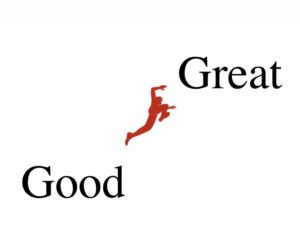 To be great at something often requires you to do the exact opposite of what it took to be good…
To be great at something often requires you to do the exact opposite of what it took to be good…
Today’s issue is going to be quick.
I was on the phone with the CEO who runs a company for one of the world’s top marketing and business thinkers.
I won’t go into too many details, because I’m not at liberty to divulge this relationship — at least for now.
But what I will tell you is that they’ve been regularly trying to hire copywriters.
And this CEO was talking just how hard it is to hire great copywriters. Especially to write for someone as discerning and experienced as their boss.
Turns out this has happened more than once…
They hire a copywriter to write a piece of direct response copy. The copywriter turns it in. They show it to the boss.
And the boss says they can’t run it.
It’s too much like what everyone else is doing. It feels derivative. Unoriginal. It doesn’t establish a unique perspective through its every detail.
To be good, you have to do what everyone else does, and do it well…
Wanna be a good copywriter? Learn the classics. Study from them. Copy them.
Not in a copyright infringement sense. But rather, in a way where you’re applying the same ideas and themes and approaches to your current situation.
Get really good at doing what everyone else is doing.
Do this really well, and you’ll quickly rise to the upper-middle of any field. You won’t get to the top. But you can make a darn good living at this.
But then, you’ll notice yourself bumping up against a ceiling…
To go from good to great, you must break all the rules…
As long as you’re doing what you do like everyone else does it, you’ll never be exceptional.
Now, being exceptional isn’t necessarily a good thing.
For example, if you haven’t learned the rules in order to break them in a calculated way, you’ll probably just end up exceptionally bad.
But once you know the rules and are great at following them, you can start to see where they don’t fit. Where there’s a better solution. Where it can be advantageous to break them in order to stand out.
It won’t always work. Being exceptional is fraught with risk.
But when it works, it will tend to work REALLY well.
Because being unique and different and exceptional in a thoughtful way is what will give you unique and different and exceptionally better results than everybody else.
It is what will make you great.
Back to the CEO mentioned above…
They were finding it’s really easy to find good copywriters.
A copywriter who understand the AWAI method, or the Kennedy method, or the Halbert method, or whatever other method.
You can find a Product Launch Formula copywriter, or an Ask copywriter, or some other copywriter who has simply bought the latest and greatest program.
But it’s really hard to find a copywriter who thinks for themselves. Who has studied the greats, but is no longer trying to copy them. Who is willing to be exceptional, even when that’s a risk.
It’s hard to find a great copywriter.
It’s hard to find a great ANYTHING.
That’s your opportunity.
Yours for bigger breakthroughs,
Roy Furr



